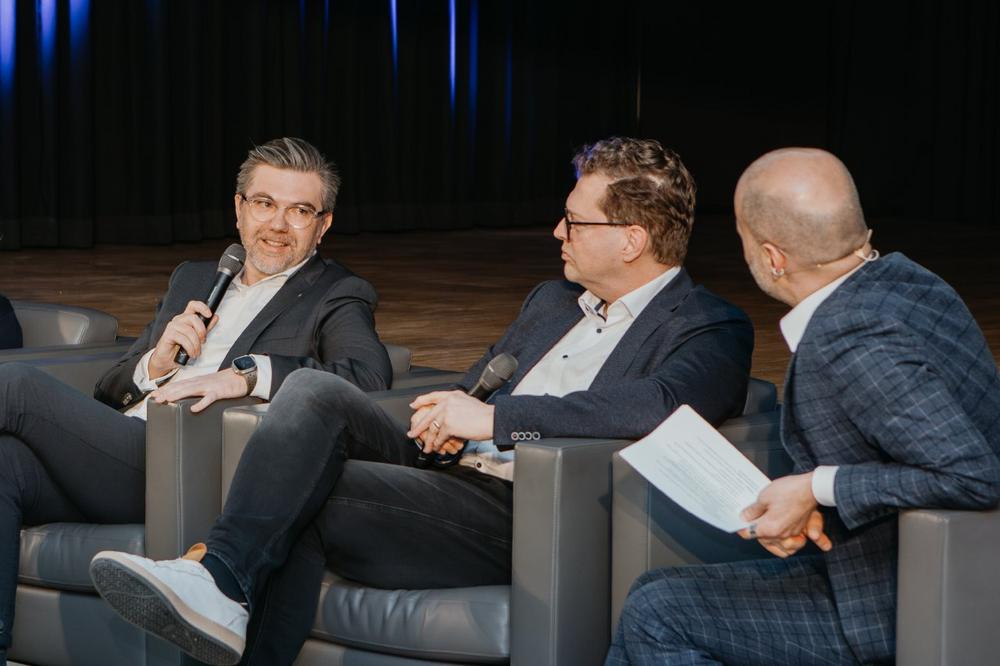Sunyaev emphasized that Humboldt’s educational ideal allows for freedom of research and teaching from politics. However, this also entails a great responsibility for researchers: “They should not only say positive things, but also express things that help humanity to move forward. To do that, you have to be courageous and also bring up things that are not always in line with the current zeitgeist.” Sunyaev explicitly called for “anti-cyclical thinking” on topics that cannot be monetized immediately – such as investing in sustainability, research and a good education.
From sustainability to quantum sensors
Claudia Doblinger, Professor of Innovation and Technology Management at TUM, agreed with Sunyaev: the researcher at the TUM Campus Straubing for Biotechnology and Sustainability and MGT regretted that the topic of sustainability has largely disappeared from the political agenda. She called for digitalization and sustainability not to be separated: “They often go hand in hand.”
Another example of a promising but still anti-cyclical topic is quantum technology, which Prof. Jens Anders from the University of Stuttgart is working on intensively. “We are spearheading the industrial exploitation of quantum sensor technology in Germany,” said the spokesperson for the BMBF Cluster4Future ‘QSens – Quantum Sensors of the Future’. In addition to technological challenges, we are also focusing on the necessary value chains in the regional ecosystem and possible business models – especially for SMEs.
Great responsibility, fruitful collaborations
In general, however, the discussion participants agreed that medium-sized companies are innovative. Doblinger emphasized the strong public perception that start-ups in particular are driving the AI revolution: “Above all, start-ups can take riskier action than medium-sized companies because the possibility of failure is generally accepted in their case.” SMEs also bear much greater responsibility than start-ups, added Jan Hartmann, CEO of Image Development Systems (IDS), a manufacturer of image processing systems and industrial cameras based in Obersulm near Heilbronn: “I took on all of my father’s employees. This responsibility does not exist in start-ups.”
SMEs can benefit from collaboration with research institutions, said Dr. Rüdiger Eichin, head of the industry-university cooperation SAP Labs Munich, which was established in cooperation with TUM: “Cooperation, co-innovation and the development of a common ecosystem are becoming increasingly important.” Which brought us back to Heilbronn, because an exemplary ecosystem has emerged around the Bildungscampus Heilbronn in recent years. Better than now, the region will be in five years, when the first phase of the AI revolution could be completed, said Bettina Peters, professor at the Leibniz Centre for European Economic Development (ZEW) and at the University of Luxembourg. And Ali Sunyaev also predicted: “In five years, not everything will be perfect, but we will be heading in the right direction.”
Challenges and opportunities
The event was preceded by another panel discussion on the topic “Shaping the future – how regions shaped by medium-sized companies can survive in the face of competition”, moderated by Cindy Rentrop, research associate at the SOT. Hanna Hottenrott, Professor of Innovation Economics at TUM MGT, saw the regions dominated by medium-sized companies in global competition “facing major challenges, but also in the starting blocks”. Johannes Schnabel, Director of Programs at Campus Founders, perceived a similar situation in Heilbronn, where top-level training opportunities coexist with the difficulty of retaining talent: “TUM students in particular are hungry, want to acquire entrepreneurial skills and learn more. But I’m not yet sure whether they perceive Heilbronn as what it wants to be.
”The importance of a network of local players was stressed again: “Our partners in the ecosystem, such as TUM and Campus Founders, help to communicate what we are experiencing here to the general public. We all benefit from this as a city and region,” said Jens Boysen, head of the Heilbronn Mayor’s office. "You need local players who come together and work across borders – between companies, but also between science and business," emphasized Hanna Hottenrott.
Dare to be more optimistic
But how can regions dominated by medium-sized companies counter the shortage of skilled workers, asked moderator Rentrop. Adrian Willig, Director of the Association of German Engineers (VDI), spoke out in favor of flexible retirement arrangements, more women in engineering professions, an early enthusiasm for technology in girls and boys, and the removal of bureaucratic hurdles for foreign skilled workers. Simone Rieß, head of the Women and Work contact point at the Heilbronn-Franconia economic region, also advocated a higher proportion of women among engineers. However, this would require more flexibility and a better balance between family and career.
“Which political measures are required to ensure the long-term competitiveness of regions characterized by SMEs?” Rentrop went on to ask. “There is no magic formula,” said Uwe Cantner, Professor of Economics at the Friedrich Schiller University of Jena and chairman of the Expert Commission for Research and Innovation (EFI). Nevertheless, society and the economy must generate solutions, not politics. However, the latter must remove uncertainty from the system and create a reliable framework for investors. A better location policy is important. And last but not least: “The players must work together in one room – as is the case in Heilbronn, where it works well.” With this statement, Cantner was on the same line as Hottenrott, who had one main wish: “A little optimism. Whining gets you nowhere.”
Die TUM Campus Heilbronn gGmbH
Bildungscampus 2
74076 Heilbronn
Telefon: +49 (0) 7131 264180
Telefax: +49 (7131) 645636-27
https://www.chn.tum.de/de
Telefon: +49 (7131) 26418-501
E-Mail: Kerstin.Besemer@tumheilbronn-ggmbh.de
![]()
